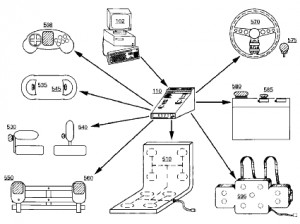 Thorner v. Sony Computer, Dkt. No. 2011-1114 (Fed. Cir. Feb 1, 2012) [PDF].
Thorner v. Sony Computer, Dkt. No. 2011-1114 (Fed. Cir. Feb 1, 2012) [PDF].
Craig Thorner and Virtual Reality Feedback Co. sued Sony Corporation alleging Sony’s game controllers with tactile feedback infringed U.S. Patent No. 6,422,941. On appeal Thorner argued that the district court erred in the construction of two term from claim 1.
Claim 1 provides in relevant part:
In a computer or video game system, apparatus for providing, in response to signals generated by said computer or video game system, a tactile sensation to a user of said computer or video game system, said apparatus comprising:
a flexible pad;
a plurality of actuators, attached to said pad, for selectively generating tactile sensation; and
a control circuit . . . for generating a control signal to control activation of said plurality of actuators . . . .
District Court Claim Construction. The district court construed the term (1) “flexible pad” to mean “capable of being noticeably flexed with ease” and (2) the term “attached to said pad” to mean attached to the outside of the pad.” The district court reasoned that the specification redefined the term attached by implication.
Claim Term Meaning. The Federal Circuit noted that words of a claim are given their ordinary and customary meaning (ordinary meaning rule) as understood by one skilled in the arts unless (1) the patentee acts as a lexicographer and provides his own definition, or (2) patentee disavows the full scope of a claim in the specification or during prosecution.
Term Use Only One Way in Spec Not Alone Limiting. The court held that the fact that the specification never used a word of a claim in reference to an embodiment that would cover the accused device–here the specification never used the word “attached” to refer to an actuator located on the interior of a controller–does not implicate either exception to the ordinary meaning rule. In other words the court said “[i]t is not enough that the patentee used the term when referencing an attachment to an outer surface in each embodiment.” The court noted that the plain meaning of the term attached included both internal and external attachment. Therefore, the court concluded that the district erred in restricting the term “attached” to only external attachment.
High Standard for Implied Redefinition. Further the court stated that for a term to be impliedly redefined, the redefinition must be be so clear that it equates to an explicit redefinition. The court stated that referring to two terms as alternatives or “disclosing embodiments that all use the term the same way” is not enough to redefine a claim term. The court said “A person of ordinary skill in the art would have to read the specification and conclude that the applicant has clearly disavowed claim scope or acted as its own lexicographer.”
The court also concluded that the district court erred in limiting the term “flexible pad” to those “capable of being noticeably flexed with ease.”